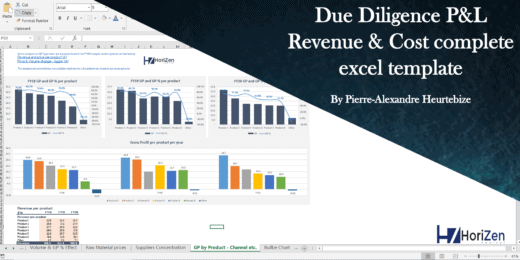Startup Model Templates in Excel that can help your Business Grow

Creating a Startup Financial Plan
Starting a business is like driving a car: You will need to consult a roadmap to find the way to your destination. The same is true for Startups. A financial plan is needed to obtain clarity on how to turn ideas into financial profitability and a sustainable business model. A financial plan is typically a key component of a business plan and builds the basis for investors when deciding whether to invest in a new venture or not.
As such, a Startup Financial Plan seeks to outline how exactly revenues will be generated and how many products need to be sold, at what prices, by when, and at which costs. Investors love these kinds of information as the business plan becomes quantifiable. It will also be the first time investors can receive a statement from the founders, which they can hold them accountable later on to find out if the investment worked as expected or not. Investors also want to understand the potential upside and how much they can eventually multiply their investment up to exit to compensate them for all the risk.
As such Financial plans are very specific to each business and need to be tailor-made. As such, they are primarily prepared in MS Excel since Excel offers the required flexibility to build a plan the way you like. Therefore, a sophisticated and tailor-made financial spreadsheet model will be needed.
Typical Questions to be Answered by a Startup Model
Startup financial models normally are prepared to obtain visibility over the next month’s and year’s cash flow needs. They typically are required to raise funding from investors. As such, they have to answer a series of important questions investors might want to know:
- What will be the sources of revenue?
- How much revenue is to be expected by when?
- What profit margins should the business generate?
- How much investment will be required for what?
- Who will provide financing for the business?
- How will the monthly budget for the first year(s) look like?
- What is the monthly cash burn rate?
- By when will the business become profitable?
- What are the expected (free) cash flows over the next 5 to 10 years?
- How much financing can be obtained from the bank?
- How much equity funding is required?
- Is the business idea financially feasible?
- How much equity stake is offered to investors?
- By when can investors expect to exit?
- What could be a possible exit valuation?
- How much return could an investor expect?
- What are the risks that the whole startup goes South?
These are just some of the typical questions investors might want to ask. The entrepreneurs behind the Startup will have to prepare to answer all of these questions in detail. For this, they will need to develop a sophisticated financial model to help them prepare the required calculations.
What the Quality of your Financial Plan tells Investors?
Presenting a financial plan to investors allows the founders of a Startup to demonstrate that they will manage investors’ funds responsibly. The way to show this is to prepare a sophisticated plan that answers the main questions outlined above.
Who would like to entrust his money to someone who is not organized or cannot plan thoroughly? Nobody.
Therefore, preparing a solid Startup Model that allows for flexible financial planning demonstrates a strong desire to understand the business model and its risks thoroughly. This typically raises confidence by investors that the founders did everything in their power to plan for the success of their business idea and that they are not behaving in a grossly negligent way.
Investors like to understand the calculations on which projected revenues, costs, and cash flows were prepared by the founders. Furthermore, they also wish the founders to be fully transparent about how the business model works and what are the likely risks. One good way to demonstrate this is to provide a financial plan in form of an editable Excel Spreadsheet model where the assumptions can be manipulated easily.
A well-structured model allows investors to change select assumptions and run their own scenarios by changing forecasted volumes, prices, costs, and profit margins. This allows for obtaining a more understanding of how the business model works and its risk. Investors plan to entrust a substantial amount of money to the founders and therefore prefer to be told the truth and understand the financial implications.
Key Components of Startup Models
Preparing a startup model requires financial modeling and industry know-how. The model should reflect the business logic and derive its projections based on a defined set of assumptions. There are specific key components financial plans for Startups should contain.
The following graphic illustrates a typical financial model structure:

Financial models for startups aim to offer a comprehensive outlook on the future financial prospects of a business. Startup models typically provide financial statements and free cash flow projections over the next 5 to 10 years. They outline the assumptions, which then translate into revenues, expected costs, and investments over the following months and years. These projections then can be aggregated into preparing a forecasted Income Statement, Balance Sheet, Cash Flow Statement, Financial Ratio Forecast, and Free Cash Flow Projections. Once this is all prepared, a variety of financial analyses can be performed to study the financial feasibility of the Startup Business Plan.
Such a Startup Financial Plan can then serve as the basis for investors to decide whether to invest or not.
Example Startup Financial Model Templates in Excel
You do not need to be a professional to create a startup financial model for your own business. What you need is the right set of tools, such as a startup financial model Excel template, to get started. By using an already prepared industry-specific financial model template prepared by somebody who already did, is much easier and faster than re-inventing the wheel from scratch. Many business models are similar and just need to t be adjusted a little bit for the plan you have in mind.
The type of startup financial model you choose will depend on what kind of business you want to run and what analysis needs to be performed.
There are different types of spreadsheet templates for startups that you can use as a base to build for your planned business, e.g. such as:
Startup Financial Plan Excel Template
Financial spreadsheet templates that turn your conceptual business plan into detailed financial projections over the next 5-10 years, resulting in forecasted Financial Statements, financial ratios, and Free Cash Flow Projections. Based on this forecast, the model typically calculates the relevant parameters such as the Internal Rate of Return (IRR), the Net Present Value (NPV), and the funding required. Some Startup templates will also go into quite a number of details of relevance to investors, such as their equity stakes, their own specific cash flow, and return forecasts up to a possible exit. Please check out available Startup Financial Models here.
Budget Templates
Many times all that is needed is a monthly budget. Startups have to pay particular attention to their monthly cash flows. Therefore, a suitable budget spreadsheet template that defines target revenues and spending and tracks the foreseeable cash position can come in quite handy. Please refer to our many budget templates here.
Break-Even Analysis
When starting a business, many times, the initial costs outweigh the revenues, leading to several months of losses. Important to know here is what volumes are required to achieve break-even. Break-even calculations depend on the business model. Therefore we have included a break-even analysis in our many templates.
Business Valuation Templates
The way to translate a business plan into a business valuation is to conduct a Discounted Cash flow analysis. Many times, Startups will require a business valuation based on an income approach to support fundraising rounds or negotiations with investors. Business valuations are also needed when looking at acquisitions or disposals. The way to go is to conduct a business valuation via the Discount Cash Flow (DCF) valuation method.
Manufacturing Businesses
Planning the creation of a manufacturing business requires planning which production capacity needs to be put in place and how the factory will be utilized. Manufacturing businesses are long-term businesses, so you need to plan ahead and figure out to which size in which time the business can develop. See our many Excel spreadsheet templates for manufacturing businesses.
Real Estate Models
Starting a real estate project is very different from starting another business. The product you are going to sell is the location and the constructed area or area to be rented out. Normally, much capital is involved with real estate, and typically there is also significant financing needed from banks. Use one of our many real estate templates to plan your next real estate project.
There are many more specific Startup Financial Model Templates available on our platform. Simply use the search box on top to find suitable financial model templates for the business models you have in mind.
These Startup financial plans are available for download and used by users such as entrepreneurs, business executives, finance professionals, CEOs, and CFOs, from different countries all over the world, such as the USA, UK, Canada, Germany, France, Italy, Spain, Singapore, Japan, India, Indonesia, South Africa, Colombia, Brazil and many more countries who are in need of assistance with their financial modeling tasks.
Financial Modeling Reduces Startup Risk!
Every Startup needs to define how it will generate revenues and profits to make the business model work. Sometimes, selecting a business model requires time, trial, and error. Startup Financial Modeling is a good way to accelerate the analysis and better understand the risks and the upside before starting a business. This alone can avoid costly mistakes and make it easier to raise funding from investors.
eFinancialModels makes it really easy to explain your business model in financial terms to investors by offering a vast range of industry-specific business model templates. Proper financial planning, in many cases, is essential to success in business. Therefore, be mindful to prepare a financial model for your business before starting operations, as it can be of tremendous help to guide you to profitability and financial success.
Additional Startup financial model template Excel files are provided below.



















































